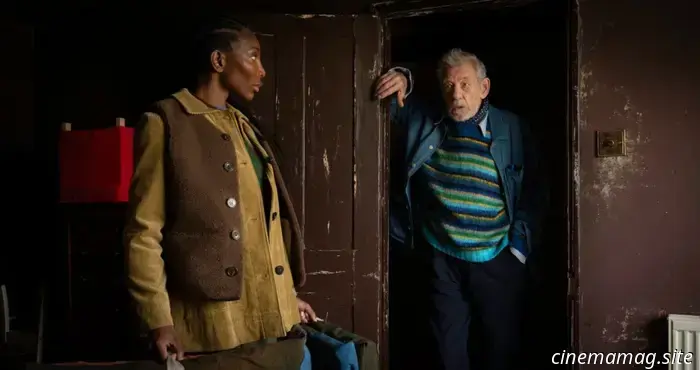
TIFF Review: Roofman Observes Derek Cianfrance Masterfully Handling a Delicate Tonal Equilibrium
Derek Cianfrance's position in contemporary American cinema may be relatively minor, yet it is still significant enough to recognize. His limited body of work, comprising just four feature films and one HBO miniseries, showcases a remarkable consistency in tone and style: a raw post-Cassavetes intensity that approaches Sirkian melodrama, deeply engaged with themes of generational trauma and fractured families. His latest project, the Emmy-winning I Know This Much is True featuring Mark Ruffalo, spans six hours, which may lean towards overwhelming misfortune bordering on self-parody. Nevertheless, it remains profoundly moving and authentic, illustrating how the director triumphs despite potential shortcomings.
This leads us to his first feature in nine years, Roofman, which features a tug-of-war dynamic between Cianfrance and star-producer Channing Tatum. The former appears focused on another narrative centered on troubled familial ties in working-class America, while the latter seems intent on a starring role that allows him to portray one of the most likable characters in recent memory. This tension is evident throughout the film; however, by the conclusion, a satisfying resolution occurs.
Roofman is inspired by the incredible true story of Jeffrey Manchester. It begins with him robbing a McDonald's, politely assuring the morning staff that he has no intention of harming anyone. This small-time criminal, a war veteran, struggles to support his family due to lack of job opportunities, despite being described as the "smartest dumb person" you'll ever meet. After being apprehended for his fast-food heists, Manchester ends up in prison, from which he executes a dramatic escape. He eventually hides out in a Toys “R” Us in North Carolina, disabling the security system to create a makeshift home while eluding law enforcement.
As he masters the surveillance cameras, he becomes infatuated with store employee Leigh (Kirsten Dunst), a single mother of two daughters facing difficulties with a quietly oppressive manager (Peter Dinklage) who denies her scheduling requests. Manchester begins a romance with her, almost instantly becoming a father figure to her teenagers. However, a darker implication arises: he appears to be neglecting his family back home, whom he initially sought to support through his robberies. Beneath his charming, "generous" persona lies a very lost individual who refuses to confront his own issues.
Tatum exudes charisma, reminding viewers that he may actually be a more skilled actor than many Oscar-winning stars. However, there is a sense of an ego-driven star vehicle; Manchester is almost excessively likable. Just when it seems that the character study aspect of Roofman might feel overly polished, the film delivers a powerful emotional punch in its final 20 minutes. In hindsight, it becomes easier to appreciate the nuanced tonal balance Cianfrance aims for throughout, resulting in a rough yet ultimately successful melodrama.
Roofman premiered at the 2025 Toronto International Film Festival and is set to release on October 10.
Other articles
 12 Behind-the-Scenes Tales from Kentucky Fried Movie, the Comedy That Inspired Airplane and Animal House
If it weren't for Kentucky Fried Movie, the debut film by Jim Abrahams along with his collaborators Jerry and David Zucker, we may never have seen Animal House, Airplane!,
12 Behind-the-Scenes Tales from Kentucky Fried Movie, the Comedy That Inspired Airplane and Animal House
If it weren't for Kentucky Fried Movie, the debut film by Jim Abrahams along with his collaborators Jerry and David Zucker, we may never have seen Animal House, Airplane!,
 TIFF Review: Steven Soderbergh’s The Christophers is an Often Uninspiring Showcase for Actors
Steven Soderbergh shows no signs of slowing down, and for that, we should be grateful. His second film of 2025, The Christophers, may well be the least necessary of the year, yet it offers significant insights into Soderbergh, his body of work, and his current position in the industry. The year kicked off with Presence, a solid ghost story that carried over from 2024, and progressed with
TIFF Review: Steven Soderbergh’s The Christophers is an Often Uninspiring Showcase for Actors
Steven Soderbergh shows no signs of slowing down, and for that, we should be grateful. His second film of 2025, The Christophers, may well be the least necessary of the year, yet it offers significant insights into Soderbergh, his body of work, and his current position in the industry. The year kicked off with Presence, a solid ghost story that carried over from 2024, and progressed with
 The Undead Iron Fist #1 - Comic Book Teaser
Danny Rand makes his comeback this week as Marvel Comics introduces The Undead Iron Fist. Below is the official preview for the first issue… THE IRON FIST RISES! According to the Book of the Iron Fist, every IRON FIST is destined to perish by the age of 33… but who was responsible for creating this […]
The Undead Iron Fist #1 - Comic Book Teaser
Danny Rand makes his comeback this week as Marvel Comics introduces The Undead Iron Fist. Below is the official preview for the first issue… THE IRON FIST RISES! According to the Book of the Iron Fist, every IRON FIST is destined to perish by the age of 33… but who was responsible for creating this […]
 10 Must-See Psychological Horror Films
Vanessa Maki presents ten exceptional psychological horror films to consider for your viewing list… The authentic dread that a well-crafted psychological horror movie can provoke is unparalleled. Be it a film such as The Shining (1980), where insanity progressively intensifies, or the frightening home invasion depicted in The Strangers (2008), the psychologically taxing…
10 Must-See Psychological Horror Films
Vanessa Maki presents ten exceptional psychological horror films to consider for your viewing list… The authentic dread that a well-crafted psychological horror movie can provoke is unparalleled. Be it a film such as The Shining (1980), where insanity progressively intensifies, or the frightening home invasion depicted in The Strangers (2008), the psychologically taxing…
 Behemoth from "Godzilla: King of the Monsters" joins Hiya Toys' Exquisite Basic Series of the MonsterVerse.
Hiya Toys has revealed that the MonsterVerse Titan Behemoth will be added to its Exquisite Basic Series action figure collection, inspired by its role in the 2019 hit Godzilla: King of the Monsters. The figure is currently available for pre-order at a price of $51.00; you can view the promotional images here… In the movie, King Ghidorah is introduced for the first time […]
Behemoth from "Godzilla: King of the Monsters" joins Hiya Toys' Exquisite Basic Series of the MonsterVerse.
Hiya Toys has revealed that the MonsterVerse Titan Behemoth will be added to its Exquisite Basic Series action figure collection, inspired by its role in the 2019 hit Godzilla: King of the Monsters. The figure is currently available for pre-order at a price of $51.00; you can view the promotional images here… In the movie, King Ghidorah is introduced for the first time […]
-Movie-Review.jpg) The History of Sound (2025) - Film Review
The History of Sound, 2025. Directed by Oliver Hermanus. Featuring Paul Mescal, Josh O’Connor, Molly Price, Alison Bartlett, Michael Schantz, Chris Cooper, Raphael Sbarge, Hadley Robinson, Peter Mark Kendall, Emma Canning, Gary Raymond, Alessandro Bedetti, Michael D. Xavier, Aidan Redmond, Aedin Moloney, Leo Cocovinis, Tom Nelis, Brian Hutchison, and Briana Middleton. SYNOPSIS: Two young men […]
The History of Sound (2025) - Film Review
The History of Sound, 2025. Directed by Oliver Hermanus. Featuring Paul Mescal, Josh O’Connor, Molly Price, Alison Bartlett, Michael Schantz, Chris Cooper, Raphael Sbarge, Hadley Robinson, Peter Mark Kendall, Emma Canning, Gary Raymond, Alessandro Bedetti, Michael D. Xavier, Aidan Redmond, Aedin Moloney, Leo Cocovinis, Tom Nelis, Brian Hutchison, and Briana Middleton. SYNOPSIS: Two young men […]
TIFF Review: Roofman Observes Derek Cianfrance Masterfully Handling a Delicate Tonal Equilibrium
Derek Cianfrance’s position in the present American film industry may seem rather limited, yet it is still significant to recognize. His brief filmography, consisting of just four feature films and one HBO miniseries, showcases a remarkable consistency in tone and style: a post-Cassavetes rawness that is elevated to the point of resembling Sirkian melodrama, with a strong emphasis on the theme of generational trauma and
